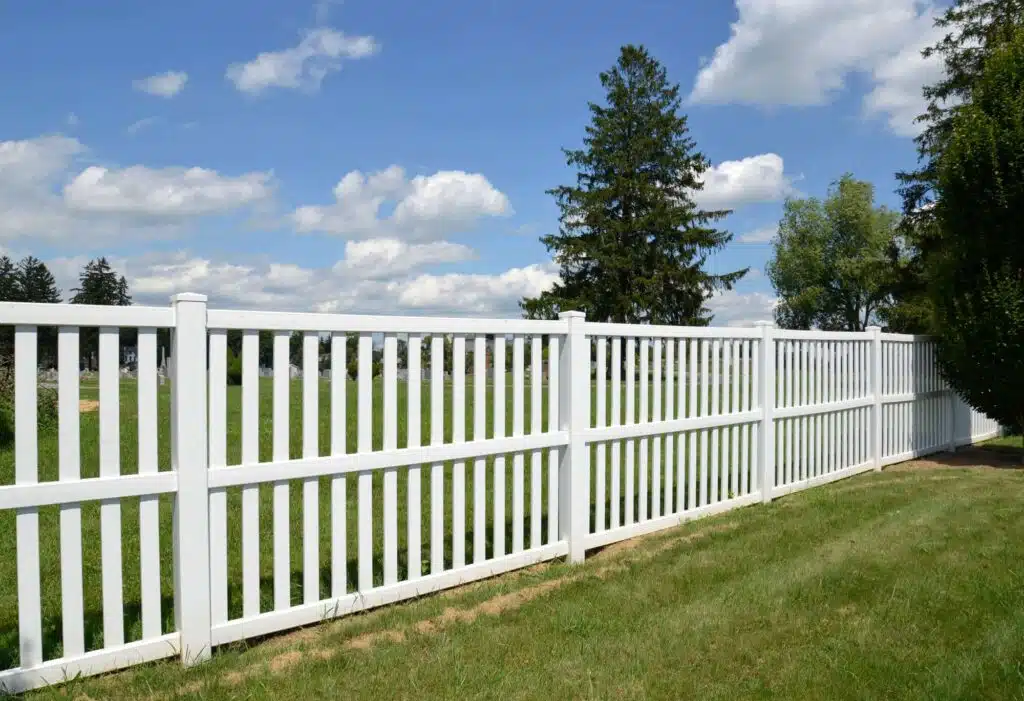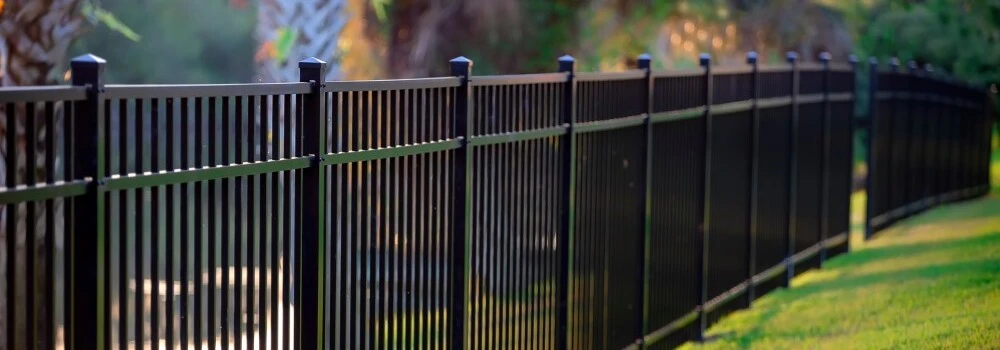
Vinyl Fencing FAQs
If you’re in the market for a new fence, then you have surely considered vinyl fencing. Vinyl fencing (also commonly referred to as PVC fencing) has quickly become the star fencing material and for good reason! Read on for our vinyl fencing FAQs. This guide is jam-packed with useful information to help you make the best choice for your fencing project.
What is the cost of vinyl compared to wood?
Vinyl fences are typically more expensive than wooden fences. However, vinyl fences have a longer lifespan and are sold with longer warranties. Both wood and vinyl fences have a range of options for style, which can affect your overall cost for both material and installation. As vinyl fencing becomes more popular, the price gap is closing. Vinyl fencing can be less expensive than ornamental steel fencing.
What is the vinyl made of?
One of the most common vinyl fencing FAQs is “what is this stuff, anyway?” Vinyl fencing is a type of plastic fence made with PVC (polyvinyl chloride). The PVC resin is combined with special ingredients that give the vinyl fence exceptional strength, durability, and weatherability. The terms “Vinyl” and “PVC” are interchangeably used in the fencing industry.
Is vinyl fencing maintenance free?
Vinyl is an easy-care alternative to other fence materials. A vinyl fence won’t warp, rot, split or blister like a wood fence, or rust, chip, peel or corrode like aluminum. Vinyl never needs sanding, staining, or painting.
How do you clean vinyl fencing?
Surface dirt and debris on your vinyl fence will wash away easily with periodic spraying from a garden hose. A mild detergent and water should be sufficient to keep your fence or deck rail looking new after the winter. For tough stains, baking soda, dish soap, and steel wool work well together.
Is PVC graffiti proof?
Although not classified as graffiti proof, PVC (vinyl) fencing is easy to clean. Paint and graffiti should come off with little effort. Cleaning off paint may require the use of a pressure washer or in extreme cases, the use of paint thinner. If that doesn’t work, then 400 grit sandpaper may be used.
How long will a vinyl fence last?
Vinyl fences are a great investment because when properly maintained, they can last for decades. Upwards of 30 years in many cases!
Can I get custom vinyl fence styles made?
Vinyl can be easily customized – height, style, even color. There are tons of options to meet your aesthetic and design needs. Keep in mind, though, that vinyl fences cannot be painted like wood or metal fences, so the color you choose is what you will have for the duration the fence stands.
Do fences come in different heights?
Common heights for front yard fences are around 3 feet, while common heights for backyard fences are between 6 and 8 feet. A professional fencing company can help you choose the right size for your project.
Can you use vinyl as a porch or guard railing?
Vinyl railings have become very popular in recent years due to their durability and maintenance-free designs. Vinyl railings won’t splinter or split, and they are fire-resistant, making them a safe choice for homes.
Can you make gates from vinyl?
If you’re having a fence installed, it’s very likely that you will want a gate, as well. While vinyl gates are no problem to add to a project, be sure to hire a professional to make and install your gate. A professional installer will make sure the gate is properly braced and that the posts are cemented in place.
Do you cement the vinyl posts?
Manufacturers unanimously require vinyl fence posts to be installed into a concrete-filled post hole. Setting vinyl posts into concrete provides a consistent footing to ensure the posts will remain inline and true for years to come. That’s why you should always trust a professional fencing company to safely install your vinyl fence.
How strong is vinyl fencing?
Though vinyl fencing has a certain amount of flexibility, the materials are engineered to be impact-resistant and withstand a wide range of normal use. The vinyl fencing FAQs address the various questions related to aging and weathering:
How does vinyl fencing stand up in the wind?
The ability of vinyl fencing to withstand wind depends on the design, as well as how the posts were installed. A picket-fence style offers less wind resistance because the wind is able to pass through the gaps, while a privacy fence provides protection from strong winds. In general, vinyl fences are designed to withstand normal wind loads.
Does a vinyl fence become brittle in the winter?
Vinyl does become less flexible in colder weather conditions. However, unless subjected to unusual impact, it should not break. It is normal for vinyl fence materials to expand and contract during temperature changes. Many vinyl products have been specifically engineered to accommodate extreme changes in weather conditions.
Will vinyl burn?
One of the pros of installing a vinyl fence is that it’s classified as “self-extinguishing,” making it safer against fire than a wood fence. PVC has a flashpoint of approximately 900 degrees and does not easily ignite.
Will a vinyl fence fade?
While vinyl fencing may lose a little of its sheen over time, it will not fade. Today’s vinyl fencing has a chemical formulation similar to sunscreen. It is designed to permanently reflect the sun’s rays and helps the material hold its colors.
Will the vinyl fence material yellow?
Nope! To prevent fading and yellowing, vinyl fencing contains titanium dioxide (TIO2) which prevents ultraviolet degradation.
Does vinyl fencing expand?
It is normal for vinyl materials to expand and contract during temperature changes. However, a professional, trained contractor will allow for such expansion and contraction during the installation process to avoid any negative effects.
Will my vinyl fence crack, chip, peel, or rot?
During the life of your vinyl fence, you should not expect to find surface cracking, peeling, chipping, or rot. Vinyl fencing material has a hard outer shell that protects it from the sun and chemical additives to help it hold its color. The inner shell is a softer compound that prevents cracking, chipping, and peeling. And since it is not a natural product like wood, it will not rot. Also, unlike metal, vinyl will not rust.
How does vinyl fencing hold up to weed eaters?
As with all vinyl and wood fences, direct contact with lawn and garden equipment can cause damage to the posts. Use caution when operating any type of equipment near fence posts, especially commercial trimmers, which are more powerful. A string trimmer also has the potential of destroying your vinyl fence, which is why if you have a lawn your fence should be at least 3 inches above the ground. In that case, you are able to trim the area carefully without worrying that the weed trimmer damages it. In general, try to avoid using those kinds of trimmers around vinyl fences or research how to carefully mow around your fence.
Bottom line
As you may have realized from our vinyl fencing FAQs, these fences are a fantastic choice for just about any home or project. The pros at Bravo Fence Company offer state-of-the-art vinyl fencing. Options include:
- Picket Style
- Privacy Style
- Ranch Rail Style
- Vinyl Fence Gates
We have more than 20 years of expertise in installation of vinyl fences. Bravo Fence is licensed, insured, and our work is backed by a 5-year warranty. If you’re looking for a trustworthy vinyl fencing company, we’d love to hear from you. Contact us here.

